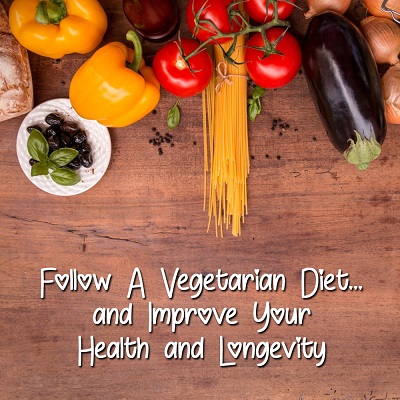 Knowing that plant-based foods contain a plethora of phytochemicals, dietary fiber, magnesium, folic acid and potassium, it is easy to assume that vegetarians have to be healthy. Plus, vegetarians are far less exposed to foods that contain high amounts of cholesterol and saturated fats, compared to their meat-eating friends.
Knowing that plant-based foods contain a plethora of phytochemicals, dietary fiber, magnesium, folic acid and potassium, it is easy to assume that vegetarians have to be healthy. Plus, vegetarians are far less exposed to foods that contain high amounts of cholesterol and saturated fats, compared to their meat-eating friends.
However, why does following a vegetarian diet help promote longevity? Here are a few scientific studies that give reasons why.
Reduces Your Risk of Diseases
Heart Disease
Research has shown that there is a lower incidence of cardiac problems among the vegetarian population. A combined analysis of data from five different studies which involved 76,000 participants showed that vegetarians are 25% less likely to suffer from any type of heart disease.
Another study conducted by the European Prospective Investigation into Cancer and Nutrition, which had 65,000 participants, also showed that following a vegetarian diet lowered a person’s risk of suffering from heart disease by as much as 19%.
Cancer
There is also scientific evidence which shows that vegetarians are less likely to suffer from different types of cancer, compared to non-vegetarians. Although it is not yet clear whether the abstinence from all meat products can indeed reduce a person’s cancer risk, experts have examined the colons of vegetarians and found lower levels of carcinogenic substances than exhibited by non-vegetarians.
Type 2 Diabetes
Most vegetarians have a lower body mass index compared to most meat eaters, and consequently have a lower risk of becoming obese or developing type 2 diabetes.
This finding is supported by a Harvard-based study conducted by Women’s Health, which showed that the avoidance of red meat and all forms of processed meats resulted in a lowered risk of colon cancer and type 2 diabetes.
These results were confirmed after making some adjustments on every study participant’s BMI and calorie intake. The BMI or Body Mass Index is one of the factors that doctors take into consideration when assessing someone’s rate of risk for diabetes and other diseases associated with metabolic syndrome.
Osteoporosis
Some people, especially women, are reluctant to follow a vegetarian diet for fear of it increasing their risk of osteoporosis. Although veganism has been found to contribute to a higher rate of fractures, experts say that this can be avoided by making sure that at least 525 milligrams of calcium-rich foods are consumed daily.
Vegetarians may obtain calcium from vegetables including broccoli, Chinese cabbage, kale and collards. Another advantage of being vegetarian is that most vegetables and fruits help lower the level of blood acidity, thereby reducing the urinary excretion of calcium.
As far as bone density goes, calcium is not the only requirement. This is true for vegetarians and meat-eaters alike. Most of these supporting nutrients, as well as calcium itself, are better obtained from vegetable sources. It is certainly possible for vegetarians to obtain healthy amounts of calcium, iron and protein from their diet.
The other vital fraction is vitamin D, which is best and most easily obtained from sensible sun exposure. Eat right and get plenty of sunshine and a vegetarian’s risk of osteoporosis is reduced.
If you are planning to shift to a vegetarian diet, and do have concerns or health issues, please make sure that you do it with the guidance of a nutritionist or health professional.






